

E-Books → Logos and Power in Isocrates and Aristotle
Published by: voska89 on 13-02-2023, 15:21 |  0
0
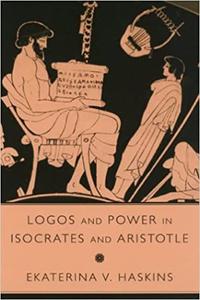
Ekaterina Haskins, "Logos and Power in Isocrates and Aristotle"
English | 2010 | pages: 187 | ISBN: 1570038732, 1570035261 | PDF | 2,5 mb
A provocative reconsideration of two competing classical approaches to discourse, politics, and education
E-Books → Ancient Relativity Plato, Aristotle, Stoics, and Sceptics
Published by: voska89 on 10-02-2023, 23:26 |  0
0
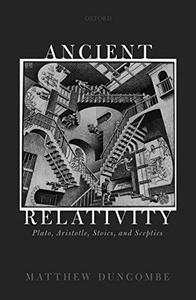
Matthew Duncombe, "Ancient Relativity: Plato, Aristotle, Stoics, and Sceptics"
English | 2020 | ISBN: 0198846185 | PDF | pages: 303 | 1.4 mb
Ideas about relativity underlie much ancient Greek philosophy, from Protagorean relativism, to Plato's theory of Forms, Aristotle's category scheme, and relational logic. In Ancient Relativity Matthew Duncombe explores how ancient philosophers, particularly Plato, Aristotle, the Stoics, and Sextus Empiricus, understood the phenomenon and how their theories of relativity affected, and were affected by, their broader philosophical outlooks. He argues that ancient philosophers shared a close-knit family of views referred to as 'constitutive relativity', whereby a relative is not simply linked by a relation but is constituted by it. Plato exploits this view in some key arguments concerning the Forms and the partition of the soul. Aristotle adopts the constitutive view in his discussions of relativity in Categories 7 and the Topics and retains it in Metaphysics Delta 15. Duncombe goes on to examine the role relativity plays in Stoic philosophy, especially Stoic physics and
E-Books → Aristotle on the Nature of Community
Published by: voska89 on 4-02-2023, 07:29 |  0
0
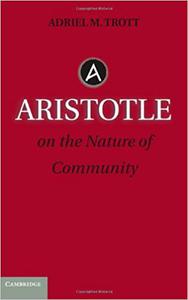
Adriel M. Trott, "Aristotle on the Nature of Community"
English | ISBN: 1107036259 | 2013 | 251 pages | PDF | 3 MB
This reading of Aristotle's Politics builds on the insight that the history of political philosophy is a series of configurations of nature and reason. Aristotle's conceptualization of nature is unique because it is not opposed to or subordinated to reason. Adriel M. Trott uses Aristotle's definition of nature as an internal source of movement to argue that he viewed community as something that arises from the activity that forms it rather than being a form imposed on individuals. Using these definitions, Trott develops readings of Aristotle's four arguments for the naturalness of the polis, interprets deliberation and the constitution in Politics as the form and final causes of the polis, and reconsiders Aristotle's treatment of slaves and women. Trott then argues that Aristotle is relevant for contemporary efforts to improve and encourage genuine democratic practices.
E-Books → Aristotle on Thought and Feeling
Published by: voska89 on 2-02-2023, 23:07 |  0
0
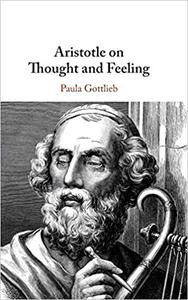
Paula Gottlieb, "Aristotle on Thought and Feeling"
English | ISBN: 1107041899 | 2021 | 300 pages | PDF | 4 MB
Aristotle's discussion of the motivation of the good person is both complicated and cryptic. Depending on which passages are emphasized, he may seem to be presenting a Kantian style view according to which the good person is and ought to be motivated primarily by reason, or a Humean style view according to which desires and feelings are or ought to be in charge. In this book, Paula Gottlieb argues that Aristotle sees the thought, desires and feelings of the good person as interdependent in a way that is sui generis, and she explains how Aristotle's concept of choice (prohairesis) is an innovative and pivotal element in his account. Gottlieb's interpretation casts light on Aristotle's account of moral education, on the psychology of good, bad and half-bad (akratic) people, and on the aesthetic and even musical side to being a good person.
E-Books → Aristotle's Ethics in the Italian Renaissance (ca. 1300-1650) The universities and the problem of moral education
Published by: voska89 on 25-01-2023, 19:00 |  0
0
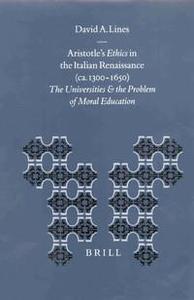
Aristotle's Ethics in the Italian Renaissance (ca. 1300-1650): The universities and the problem of moral education By David A. Lines
2002 | 613 Pages | ISBN: 9004120858 | PDF | 63 MB
This volume studies the teaching of Aristotle's Nichomachean Ethics (the standard textbook for moral philosophy) in the universities of Renaissance Italy. Special attention is given to how university commentaries on the Ethics reflect developments in educational theory and practice and in humanist Aristotelianism. After surveying the fortune of the Ethics in the Latin West to 1650 and the work's place in the universities, the discussion turns to Italian interpretations of the Ethics up to 1500 (Part Two) and then from 1500 to 1650 (Part Three). The focus is on the universities of Florence-Pisa, Padua, Bologna, and Rome (including the Collegio Romano). Five substantial appendices document the institutional context of moral philosophy and the Latin interpretations of the Ethics during the Italian Renaissance. Largely based on archival and unpublished sources, this study provides striking evidence for the continuing vitality of university Aristotelianism and for its fruitful interaction with humanism on the eve of the early modern era.
E-Books → Aristotle's Ethics
Published by: voska89 on 21-01-2023, 15:31 |  0
0
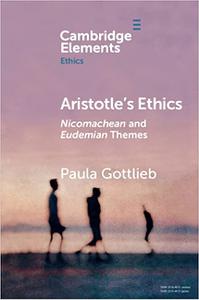
Paula Gottlieb, "Aristotle's Ethics "
English | ISBN: 1108706576 | 2022 | 80 pages | PDF | 1516 KB
This Element is an examination of the philosophical themes presented in Aristotle's Nicomachean and Eudemian Ethics. Topics include happiness, the voluntary and choice, the doctrine of the mean, particular virtues of character and temperamental means, virtues of thought, akrasia, pleasure, friendship, and luck. Special attention has been paid to Aristotle's treatment of virtues of character and thought and their relation to happiness, the reason why Aristotle is the quintessential virtue ethicist. The virtues of character have not received the attention they deserve in most discussions of the relationship between the two treatises.
E-Books → Evil in Aristotle
Published by: voska89 on 14-01-2023, 19:48 |  0
0
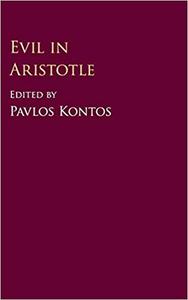
Pavlos Kontos, "Evil in Aristotle"
English | ISBN: 1107161975 | 2018 | 284 pages | PDF | 2 MB
Aristotle's notion of evil is highly elaborate and attractive, yet has been largely overlooked by philosophers. While most recent studies of evil focus on modern understandings of the concept, this volume shows that Aristotle's theory is an invaluable resource for our contemporary understanding of it. Twelve leading scholars reconstruct the account of evil latent in Aristotle's metaphysics, biology, psychology, ethics, and politics, and detect Aristotelian patterns of thought that operate at certain landmark moments in the history of philosophy from ancient thought to modern day debates. The book pays particular attention to Aristotle's understanding of 'radical evil', an important and much disputed topic. Original and systematic, this study is the first to provide a full exploration of evil in Aristotle's work, shedding light on its content, potential, and influence. The volume will appeal to scholars of ancient Greek philosophy as well as to moral philosophers and to historians of philosophy.
E-Books → Aristotle's Powers and Responsibility for Nature
Published by: voska89 on 22-12-2022, 22:11 |  0
0
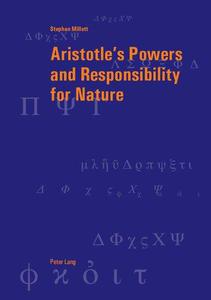
Aristotle's Powers and Responsibility for Nature By Stephan Millett
2011 | 304 Pages | ISBN: 3034306792 | PDF | 2 MB
This book addresses the theme of what «nature» is and humans' obligations toward the natural world. It demonstrates that an approach based in metaphysics can help us to understand better what nature is and our obligations to the natural world. Beginning with ideas traced from Aristotle through some of the signifcant figures in European philosophy, the author shows that each living thing is a unique source of value. He then argues that this value puts humans under an obligation and that adopting an attitude of responsibility to living things is an essential part of what it means to be human.
E-Books → Michael of Ephesus On Aristotle's Nicomachean Ethics 10 with Themistius On Virtue
Published by: voska89 on 22-12-2022, 16:11 |  0
0
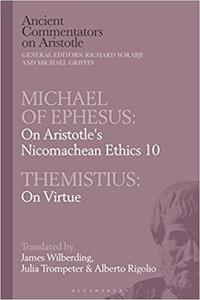
Michael Griffin, "Michael of Ephesus: On Aristotle's Nicomachean Ethics 10 with Themistius: On Virtue "
English | ISBN: 1350085073 | 2018 | 288 pages | PDF | 2 MB
The two texts translated in this volume of the Ancient Commentators on Aristotle series both compare the happiness of the practical life, which is subject to the hazards of fortune, with the happiness of the life of philosophical contemplation, which is subject to fewer needs.
E-Books → Love and Objectivity in Virtue Ethics Aristotle, Lonergan, and Nussbaum on Emotions and Moral Insight
Published by: voska89 on 29-11-2022, 12:08 |  0
0
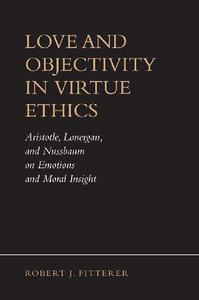
Love and Objectivity in Virtue Ethics: Aristotle, Lonergan, and Nussbaum on Emotions and Moral Insight By Robert John Fitterer
2008 | 192 Pages | ISBN: 080209788X | PDF | 1 MB
Since the Enlightenment, a great deal of ethical philosophy has presumed that rational human beings must set aside their emotions when seeking to make objective and sound moral decisions. Love and Objectivity in Virtue Ethics challenges this presumption, arguing that emotions such as compassion and love are powerful aids in the complex process of attaining objective moral truths in decisions and actions.Drawing on Aristotle's Nicomachean Ethics and the work of Bernard Lonergan and Martha Nussbaum, Robert J. Fitterer tests the assumption that the inclusion of the emotions leads to bias in objective judgments or when determining moral truths. Fitterer first demonstrates how certain cognitive operations set out in Aristotelian virtue ethics can indeed arrive at objective moral truth precisely through the contribution emotions make in moral discernment. Then, drawing on Lonergan's notion of inductive insight, he argues that objectivity is the result of the properly functioning subjectivity of a moral agent. Finally, building on his study of Nussbaum's ethical writings, Fitterer concludes that compassionate love is an attitude that actually fosters the likelihood of discerning and choosing the genuine good, and encourages objectivity in moral decision-making.Richly detailed and argued, Love and Objectivity in Virtue Ethics is a convincing study that involves the works of three of the most important writers on ethics and a passionate appeal to re-examine the process through which humans genuinely make vitally important decisions.



